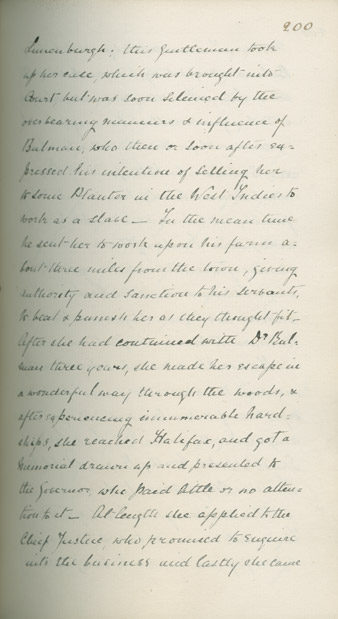Nova Scotia Archives
African Nova Scotians in the Age of Slavery and Abolition
John Clarkson's account of the story of Lydia Jackson
note: transcription publicly contributed - please contact us with comments, errors or omisions
Lunenburg. This gentleman took up her case which was brought into Court but was soon silenced by the overbearing manners & influence of Bulman, who then or soon after expressed his intention of selling her to some Planter in the West Indies to work as a slave. In the meantime he sent her to work upon his farm about three miles from the town, giving authority and sanction to his servants to beat & punish her as they thought fit. After she had continued with Dr. Bulman three years, she made her escape in a wonderful way through the woods & after experiencing innumerable hardships, she reached Halifax, and got a Memorial drawn up and Presented to the Governor, who paid little or no attention to it. At length she applied to the Chief Justice, who promised to enquire into the business and lastly she came
Lydia Jackson was likely one of two persons named 'Lydia' from South Carolina listed in the Book of Negroes (1783). Clarkson narrates her ordeal in his journal. A free black settler at Manchester (Guysborough County), Jackson was deserted by her husband and became an indentured servant to a Loyalist. He tricked her into agreeing to a much longer term of service and immediately sold her, as if she were a slave, to Dr John David Bolman of Lunenburg. Bolman had been a Hessian regimental surgeon (on the British side during the American War of Independence.) He abused her severely, even while she was in the last month of pregnancy. After three years she escaped to Halifax. Not surprisingly, she was among those who chose to emigrate to Sierra Leone.
Like her more famous contemporary, Rose Fortune, Lydia Jackson has not been forgotten. Her ordeal has been the subject of poetry as well as history. She appears as an icon ("Lydia Jackson, slave madonna") in a 1982 poem expressing rage against slavery, nearly 200 years after Clarkson wrote about her in his journal. (George Elliott Clarke, "Hammonds Plains African Baptist Church" in George Elliott Clarke, ed., Fire on the Water: An Anthology of Black Nova Scotian Writing vol. 2, Pottersfield Press 1992)
Date: 30 November 1791
Reference: John Clarkson Nova Scotia Archives MG 1 volume 219 pages 197-201; published in Clarkson's Mission to America, 1791-1792 page 89-90 (Public Archives of Nova Scotia Publication number 11, 1971) (F90 /N85/ Ar2P number 11) view this publication PDF

